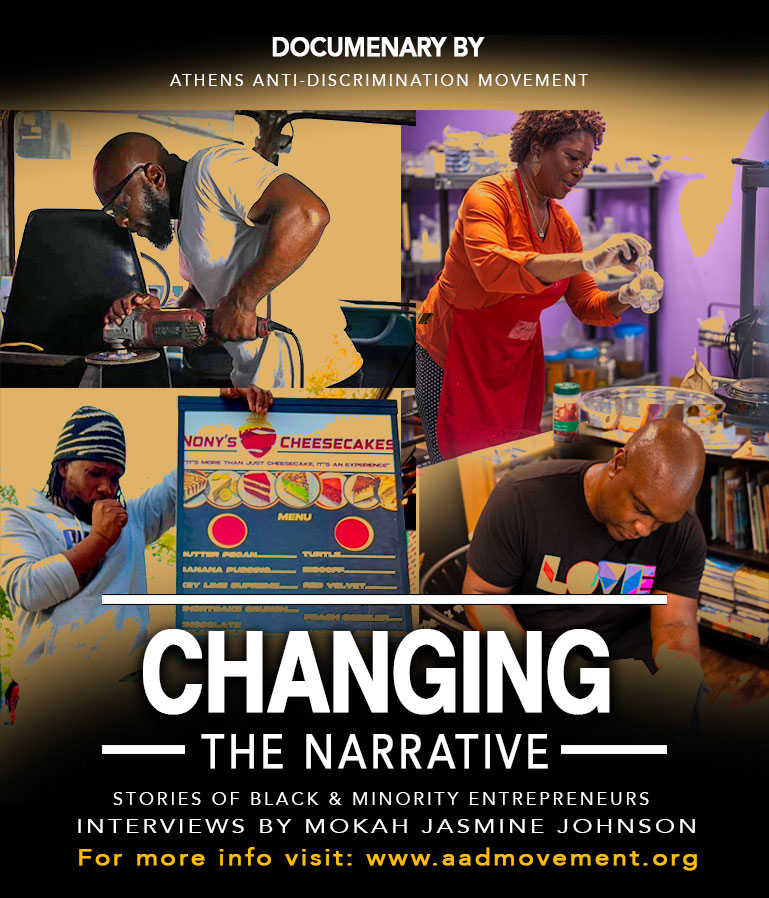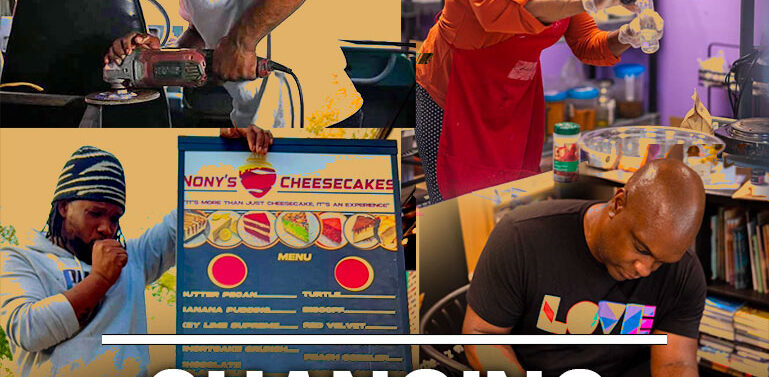Due to centuries of slavery and Jim Crow segregation in the South, the Athens economy remains deeply unequal with persistent wealth and income gaps for Black residents, women and other groups compared to white men. Systemic challenges like unequal access to capital still exist for many Americans even as President Donald Trump dismantles diversity, equity and inclusion initiatives across the country.
While the problem of structural racism probably won’t go away anytime soon, this gloomy picture doesn’t have to be the end of the story for aspiring Black business owners in Athens.
In a new documentary produced by the Athens Anti-Discrimination Movement called Changing the Narrative: Stories of Black and Minority Entrepreneurs, AADM’s Executive Director Mokah Jasmine Johnson interviews four Black business owners in and around Athens who have succeeded despite the obstacles. These entrepreneurs—including Adrienne Chappell, the owner of Chalises Heavenly Inspired; Marcus “Nony” Lawrence of Nony’s Cheesecakes; Maxim Watkins, the owner of Food Truck Builders A-Z; and Barnard Sims of Barnard’s Hair Salon—have some advice for Black Athenians who are just starting out in the business world.
“If I had to do it all over again, the first thing I would do is find a mentor,” Lawrence said during a panel discussion following a screening of the film at Ciné Feb. 28. “Get somebody who’s made the mistakes, who’s dealt with the successes and the failures so that you don’t have to deal with the costs of the failures.”

In the documentary, Lawrence said that while he sometimes struggles to gain access to the capital he needs to expand, most of the challenges he faces in business are the same struggles any restaurant owner would go through, such as finding consistency in the kitchen and growing a customer base. Similarly, when Johnson asked Chappell about the challenges she faces in managing her line of skin care products, Chappell talked about the challenge of learning the large number of different skills an entrepreneur needs in order to be successful, such as marketing, social media, production, purchasing, keeping the books and tracking inventory. “The whole business operation can be challenging and overwhelming trying to do it alone,” she said.
After 12 years, Chappell was able to hire her first employee. Now, Chappell wants to give back to her community. She said she hopes that she can use her Winterville store as a resource for other Black entrepreneurs who are just starting out. “I think us entrepreneurs coming together, building a pool of resources within each other to tap into [can benefit us all],” Chappell said.
To that end, Chappell has been offering shelf space in her store to other business owners. These partners in turn encourage their friends and supporters to come out, helping their customers discover both lines of products. She’s also started an in-person meetup group at her store where entrepreneurs can share resources, teach each other skills and give advice.
Athens-Clarke County Commissioner Patrick Davenport, the operations manager of Peachy Green Clean Cooperative, was also included on the panel along with Clarke County Board of Education member LaKeisha Gantt, owner of MindSprings Counseling and Consulting. Panelists and moderator Tamika Money spoke more about the issue of structural racism.
“There’s a good ol’ boys’ club. They go out to dinner, they have drinks, and we’re not invited to that. You may learn about [a government contract] six months in advance; I don’t learn about it until two weeks into the [request for proposals], and I have to hurry up to try and get it together,” Money said. “There has been a system put in place advancing certain businesses over others, and we’re talking about having that over centuries.”
Money asked Davenport for an update on a racial equity resolution and hypothetical ordinance that may come up for a vote of the ACC Commission next month. The purpose of the legislation is to help reverse past inequities, but Davenport said he doubts whether it will be ready in time.
“If you get an ordinance done in 60 days, my hat’s off to you. It took us six years to fix our leasing policy [which had been criticized as discriminatory]. It took us four and a half years to get our [women and minority-owned business support] program, and kinks still need to be worked out,” Davenport said. “I just try to keep it real to the community: The possibility of an ordinance getting done [by next month] is zero.”
That’s not to say that the local government can’t do anything to support Black business owners. First, Davenport wants the ACC Commission to issue a formal statement of support for racial equity and economic justice. Going further, he wants to continue reexamining government contracting policies to ensure that businesses owned by women and people of color get an equitable share of government contracts going forward.
While supportive of government efforts to fight structural racism, other panelists lamented the current political climate and didn’t seem to expect the government to be a significant ally going forward. “We’re watching the progress of the past 60 years that our ancestors have fought for being snatched away in front of our eyes. What I hope people get from a documentary like this is that DEI [diversity, equity and inclusion] could be taken away, but DIY [do it yourself] is enduring,” said Sims, author of the book The Southern Awakening: A Black Man’s Guide for Liberating the Rural South.
Lawrence, who grew up in public housing in East Athens, said that he wants the success of Nony’s Cheesecakes to be a positive example for the Black youth in Athens. “I want them to see that you can come from a place like Nellie B… and you don’t have to succumb to the streets, gangs. You don’t have to become a rapper,” he said. “My biggest goal [is] to be an example for that next generation that you can make it, regardless of your situation.”
Like what you just read? Support Flagpole by making a donation today. Every dollar you give helps fund our ongoing mission to provide Athens with quality, independent journalism.










